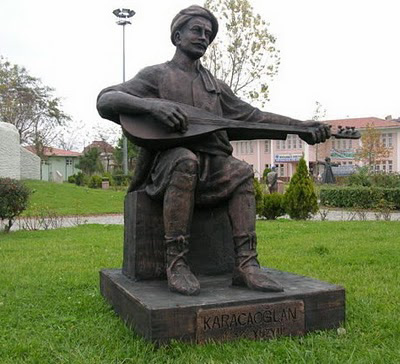A BARD’S LIFE OF LOVE: KARACAOĞLAN

Karacaoğlan was a captivating folk poet who took pleasure in capturing women’s hearts. He was handsome with dark features and soulful eyes. His love poems are among the most enchanting in the Turkish language. He sang these as he accompanied himself on a simple string instrument called the saz. Many of them were improvised when the poet was inspired by the delights of nature or the beauty of women.
This “bard of love” lived in the 17th century (no one really knows his years of birth and death). He was probably raised among nomadic tribes in Southern Turkey. But, during his long life (he lived to be seventy or possibly eighty), he roamed far and wide, singing his poems in innumerable places. He went to towns and villages in Anatolia and visited Egypt, Tripoli, and the Balkans. His life of love, of poetry, of music became legendary. Today, people in many parts of Turkey cherish Karacaoğlan’s simple, melodious, touching lyrics.
In his youth, Karacaoğlan was passing through a town. Strumming his saz, he came upon a rose garden. As he grew ecstatic from the vivid colors and the exquisite smell of the roses, suddenly his eyes fell on an indescribably beautiful girl sauntering among the flowerbeds. He stood there, bewitched. He was already feeling in his heart the flames of love - - and, unable to restrain himself, he broke into song. The lovely young woman took a few steps toward him and listened with heart and soul. When the song was over, she started to walk away without uttering a word. Alarmed that he might never lay eyes on her again, the poet implored: “You are the loveliest of all lovely women. Please stay a while. At least tell me your name?” She hesitated. Then, in a barely audible voice, she said, “Elif.”
Karacaoğlan was struck by the symbolic significance of “Elif”, a name common among the Turks for many centuries: It is derived from “aleph”, the first letter of the Arabic alphabet, with the numerical value of l. Elif stood there, the epitome of gracefulness, dainty as a leaf. For the young poet, this slender girl was the beginning of all things.
They exchanged a few polite words. She had heard of the minstrel. After a few sentences, she revealed that she was married and had children. Karacaoğlan was distressed: He had found and lost his beloved in the same instant. He also found out that she came from a well-to-do family and could read and write.
Desperately in love at first sight, the young minstrel began to serenade this exquisite woman. He chanted a poem that has enchanted the Turks for more than three centuries now. The poem celebrates her among the many splendors of nature - - and bemoans the pain inflicted by unrequited love:
With its tender flakes, snow flutters about,
Keeps falling, calling out “Elif… Elif…”
This frenzied heart of mine wanders about
Like minstrels, calling out “Elif… Elif…”
Elif’s robe is embroidered all over;
Her eyes – like a baby goshawk’s – glower.
She smells lovely like a highland flower,
With those scents calling out “Elif… Elif…”
When she frowns, her glance is a dart that goes
Into my heart: I fall into death’s throes.
In her white hand she holds a pen - she knows
What she writes, calling out “Elif… Elif…”
Right in front of her home a trellis stands;
There’s Elif, holding glasses in her hands.
It’s as if a duck whose head has green strands
Gently floats, calling out “Elif… Elif…”
I am the Minstrel: your slave for my part.
There’s no love for other belles in my heart.
Unbuttoning the shirt, I tear apart
The collars, calling out “Elif… Elif…”
Rumors were afoot among the people who heard these poems and songs that the handsome minstrel lavished on Elif. When her husband heard the rumors, he asked the feudal lord of the region to take action. Already in trouble because of his satirical poems criticizing the powers that be, Karacaoğlan was forced to leave town and his beloved Elif.
During his travels, he fell in love again - - this time with the daughter of another lord. He had just arrived in a town where he noticed a large gathering in front of a luxurious mansion. They told him the lord was holding a contest among poets. Karacaoğlan went in and sang a few of his love lyrics. Everyone was spellbound. He was declared the winner. The lord became his patron and often invited him to recite and sing.
Karacaoğlan found the lord’s daughter Suna adorable. But he was cautious and circumspect. One day, when he was strumming his saz in the garden, Suna came to him and said: “I just love your poems. Would you please compose a poem for me? Please...”
The minstrel broke into song immediately. For his Suna he started a poem that started with...
Loveliest of all, how lovelier you are now
Since no one else saw you, no one laid eyes on you:
That black lovelock of yours is curled up on your brow
Since there is no braid on it, just no braid on you.
and ended with...
Call, go on, keep calling out, Karacaoğlan:
The rock weighs heavy only in its own place.
The brave young man might cool off if his loved one
Gives him no embrace, gives him no loving embrace.
So, a passionate love affair started between Suna and the poet.
But, before long, her father heard about the affair and was so furious that he had Karacaoğlan thrown into jail.
After some time, Suna found a way of having him escape. About to leave, Karacaoğlan begged her to elope with him. But she was reluctant to abandon her family’s life of wealth and power for a wandering poet’s life of hardship. So, Karacaoğlan bade farewell and went on the road all by himself.
Wherever he went he was never without the company of beautiful women. They took a fancy to him...many of them chased him...they cherished his love lyrics.
Karacaoğlan always responded affectionately. When he ran into three wonderful beauties who did a special dance for him, he mused heartily and a bit naughtily:
If I were to love the elders the best,
Wouldn’t that be unfair to the youngest ?
The great Anatolian minstrel spent the rest of his life roaming villages and towns, hills and valleys. He had countless love affairs and composed tender lyrics as well as erotic poems for the women he loved.
Some of his poems express a chilling fear of death. It was as if the poet kept traveling far and wide to make it impossible for death to catch up with him:
Death, do not tire yourself out by stalking me;
Be gone for a while, Death, come some other time.
You won’t spare me, you shall have me in the end;
Be gone for a while, Death, come some other time.
I often roamed from this highland to that plain
Where I would eat, drink, be merry, entertain.
I kept fleeing from you, yet you came again.
Death, be gone for a while, come some other time.
Howling like the gray wolf has not been my fate.
This false world I can neither praise nor berate.
With friends and loved ones I failed to congregate.
Be gone for a while, Death, come some other time.
I am the Minstrel who is gripped by dismay
In the garden where nightingales sing and play.
Stop! You snatched my father and mother away -
Be gone for a while, come some other time, Death.
The people of Anatolia feel that Karacaoğlan escaped death, because his lovely poems and songs have achieved immortality.
Prof. Talat S. Halman
Chairman, Department of Turkish Literature
Bilkent University
Source: http://www.byegm.gov.tr/YAYINLARIMIZ/newspot/2001/sept-oct/n5.htm








